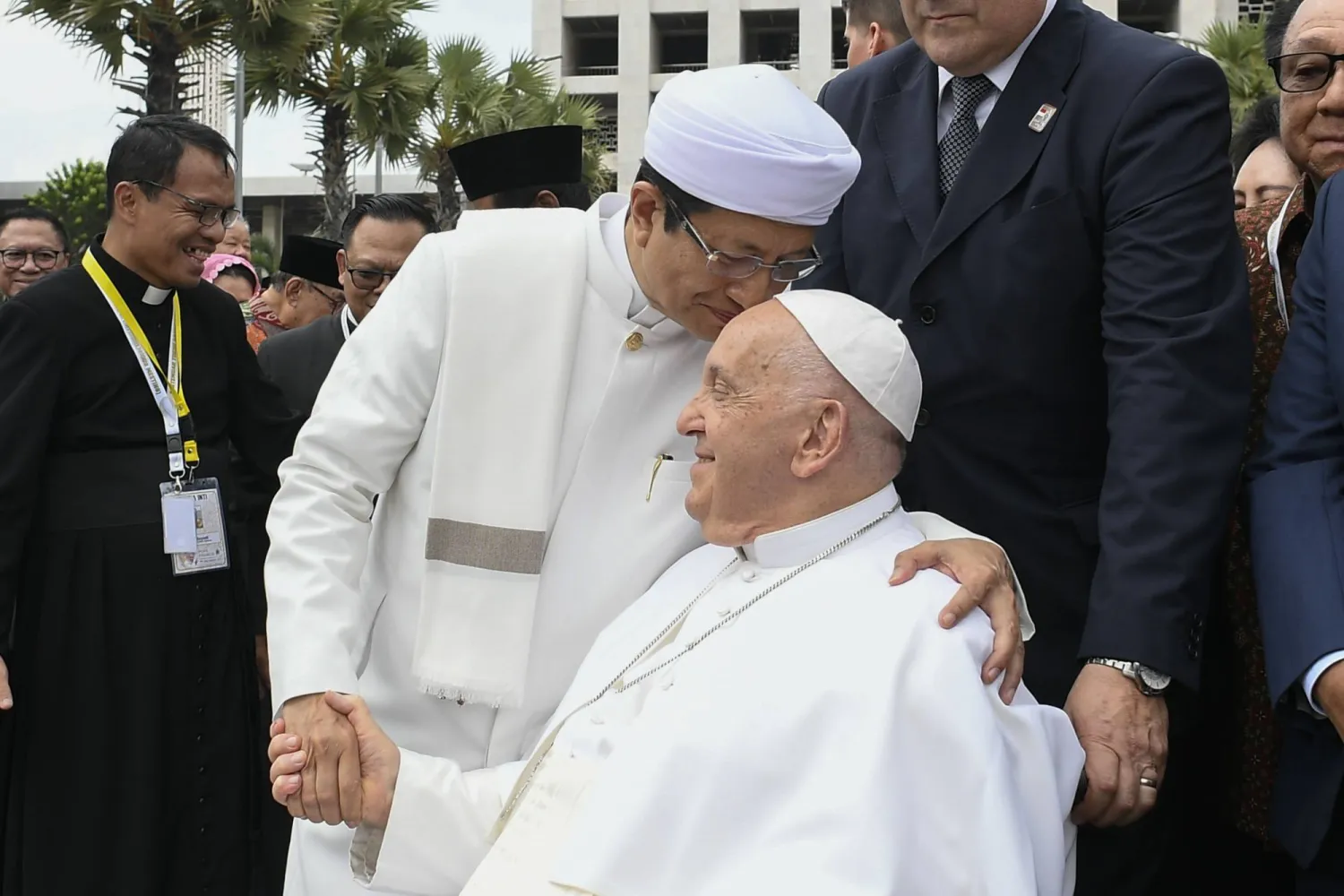Pope Francis and the grand imam of Southeast Asia’s largest mosque vowed Thursday to fight religiously inspired violence and protect the environment, issuing a joint call for interfaith friendship and common cause at the heart of Francis’ visit to Indonesia.
In an encounter rich with symbolic meaning and personal touches, Francis traveled to Jakarta’s iconic Istiqlal Mosque for an interreligious gathering with representatives of the six religions that are officially recognized in Indonesia: Islam, Buddhism, Confucianism, Hinduism, Catholicism and Protestantism.
There, he and the grand imam, Nasaruddin Umar, stood at the ground-level entrance to the “Tunnel of Friendship,” an underpass which connects the mosque compound with the neighboring Catholic cathedral, Our Lady of the Assumption.
Indonesia, which has the world’s largest Muslim population, has held out the tunnel as a tangible sign of its commitment to religious freedom, which is enshrined in the constitution but has been challenged by repeated instances of discrimination and violence against religious minorities.
Approaching the elevator to the tunnel, Francis said it was a potent sign of how different religious traditions “have a role to play in helping everyone pass through the tunnels of life with our eyes turned towards the light.”
He encouraged all Indonesians of every religious tradition to “walk in search of God and contribute to building open societies, founded on reciprocal respect and mutual love, capable of protecting against rigidity, fundamentalism and extremism, which are always dangerous and never justifiable.”
Francis traveled to Indonesia, at the start of an 11-day, four-nation trip to Asia and Oceania, to encourage Indonesia to combat religiously inspired violence and pledge the Catholic Church’s commitment to greater fraternity.
The meeting at the mosque showed the personal side of that policy, with Francis and Umar — the 87-year-old pope and the more youthful 65-year-old imam — showing a clear affinity for one another. As Francis was leaving in his wheelchair, Umar bent down and kissed Francis on the head. Francis then grasped Umar's hand, kissed it and held it to his cheek.
The event began with a similarly moving moment, as a visually impaired Indonesian teenage girl, Kayla Nur Syahwa, chanted verses from the Quran about tolerance among believers of different faiths.
Francis has made improving Catholic-Muslim ties a hallmark of his papacy and has prioritized travel to majority Muslim nations to further the agenda.
The interfaith gathering was the highlight of Francis’ visit to Indonesia, which concludes later Thursday with a giant Mass in Jakarta’s stadium expected to draw some 60,000 people.
Francis is seeking to encourage their faith by becoming the third pope to visit Indonesia, after Paul VI in 1970 and John Paul II in 1989.
On Friday, Francis heads to Papua New Guinea for the second leg of his trip, one of the longest and farthest in papal history, which will also take him to East Timor and Singapore before it ends Sept. 13.
Pope and Imam of Southeast Asia's Largest Mosque Make Joint Call to Fight Violence, Protect Planet

05 September 2024, Indonesia, Jakarta: Imam Nasaruddin Umar greets Pope francis as they meet at the Istiqlal Mosque in Jakarta. Photo: Vatican Media/IPA via ZUMA Press/dpa

Pope and Imam of Southeast Asia's Largest Mosque Make Joint Call to Fight Violence, Protect Planet

05 September 2024, Indonesia, Jakarta: Imam Nasaruddin Umar greets Pope francis as they meet at the Istiqlal Mosque in Jakarta. Photo: Vatican Media/IPA via ZUMA Press/dpa
لم تشترك بعد
انشئ حساباً خاصاً بك لتحصل على أخبار مخصصة لك ولتتمتع بخاصية حفظ المقالات وتتلقى نشراتنا البريدية المتنوعة







